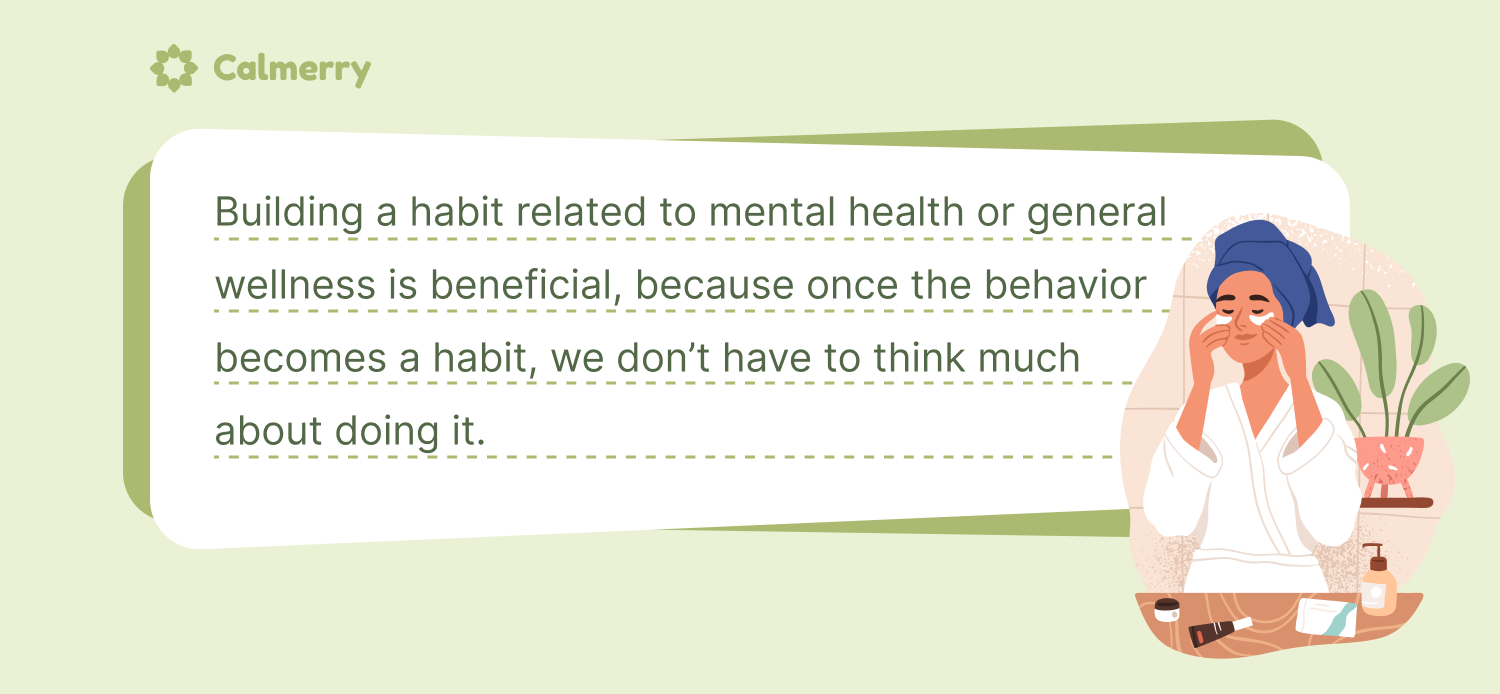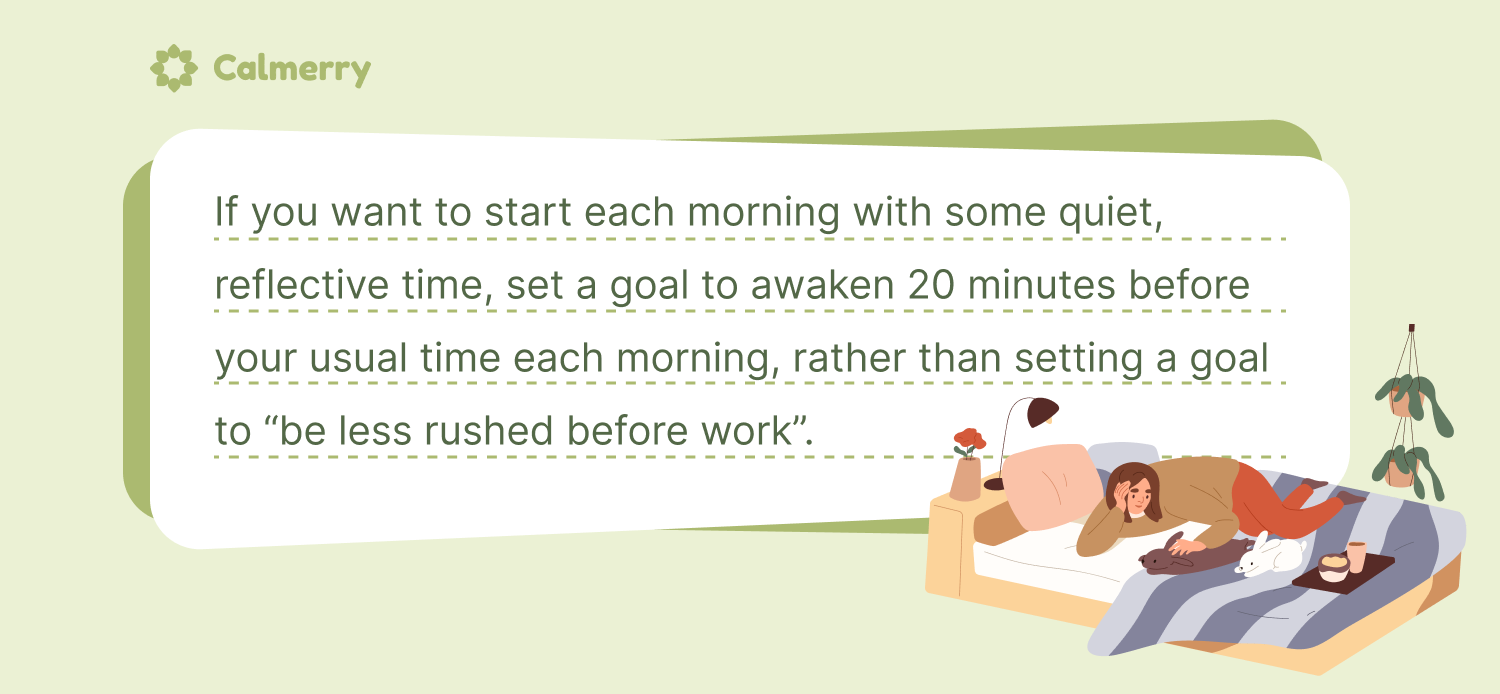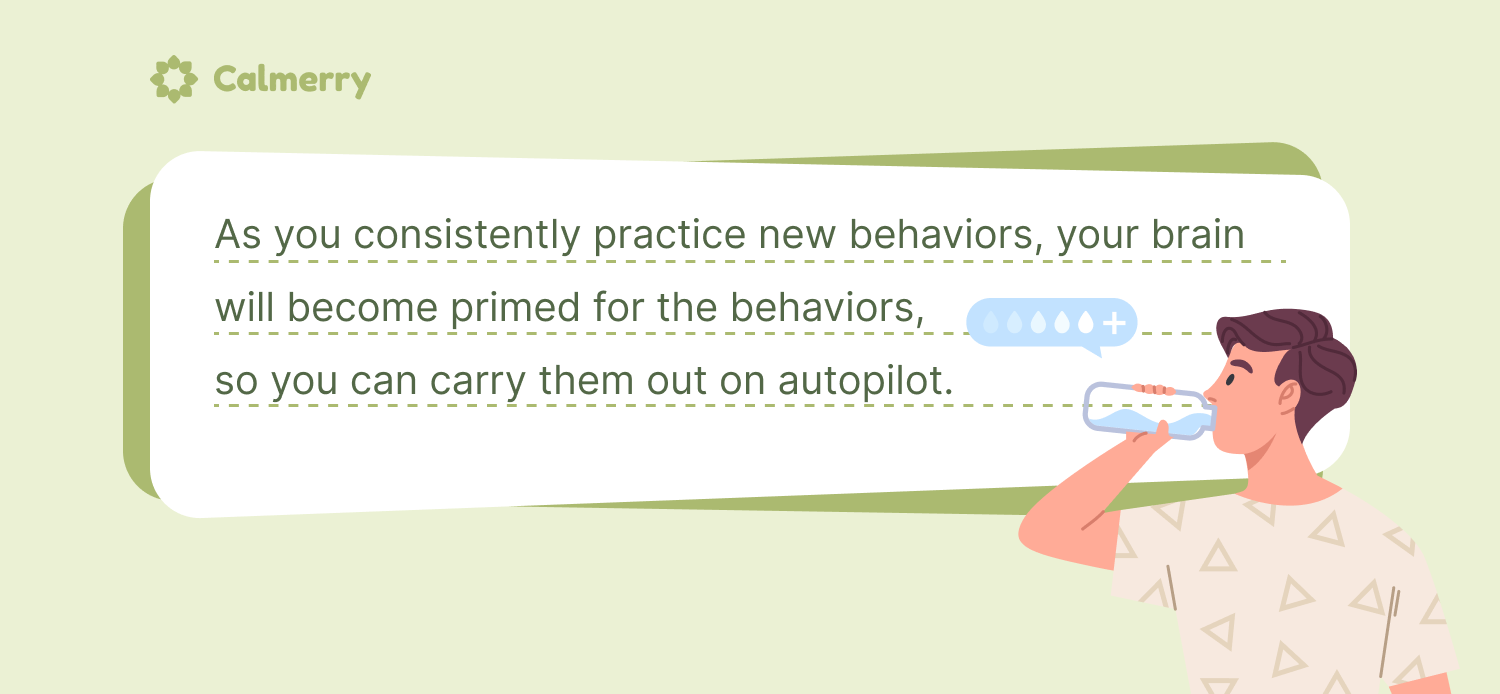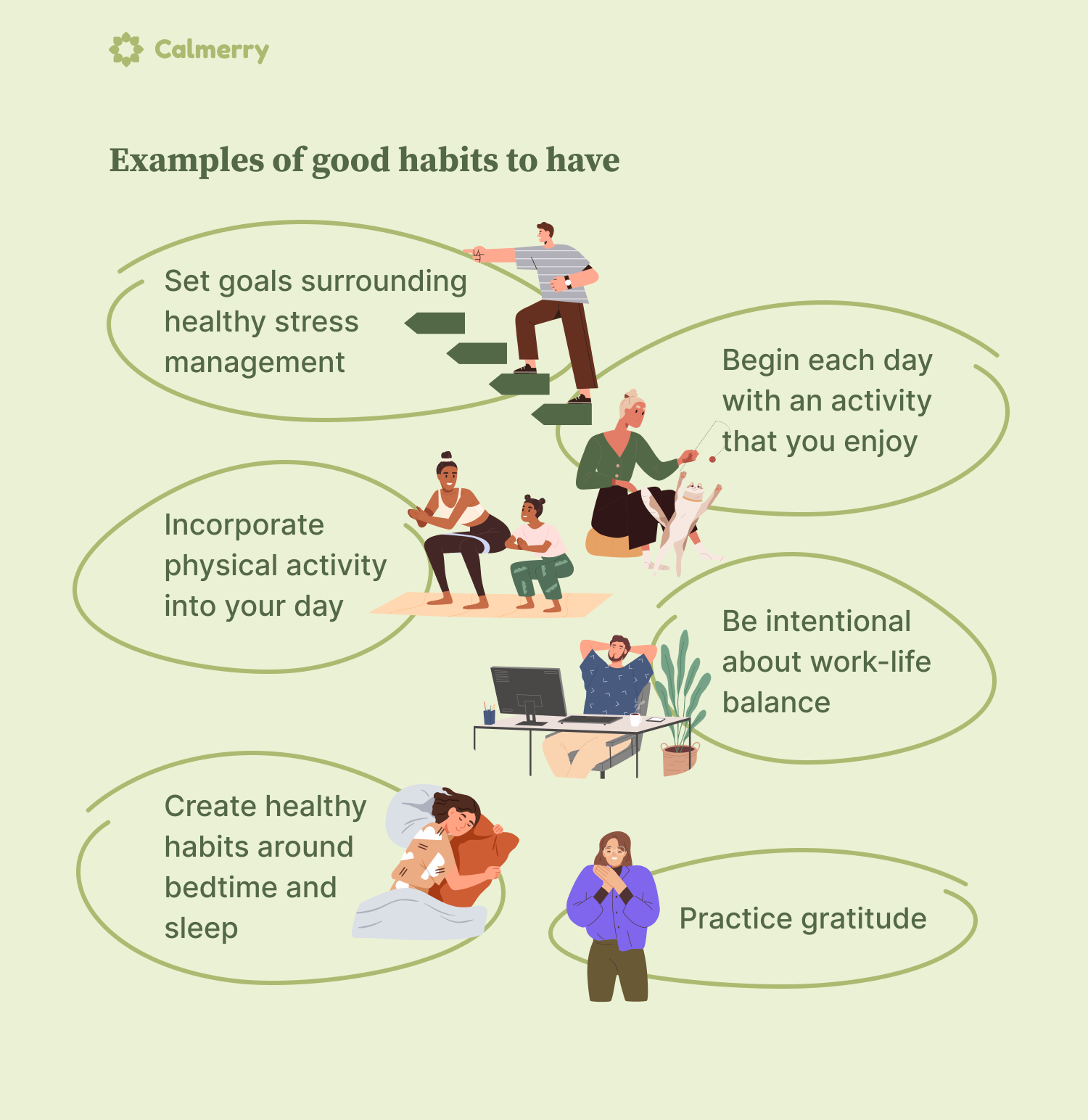Building Healthy Habits to Improve Your Mental Health (6 Examples)

In this article
As the new year started, it’s not uncommon to hear people talk about their goals for the coming year. Many of these goals focus on self-improvement, which could involve going back to school, getting into shape, or simply making more of an effort to prioritize health and wellness.
While most people start the year with the best of intentions, the truth is that New Year’s resolutions do not always play out as expected. One recent study found that after one year, 55% of people who had set New Year’s resolutions considered themselves successful.
What this means is that efforts to break negative habits are successful only about half of the time. So, what can you do to be successful with forming habits to improve mental health? Learn some research-backed strategies below.
What is a habit?
Before jumping into strategies for building new habits, it’s helpful to have an understanding of what a habit is. From a psychological standpoint, the term “habit” refers to a learned automatic response. When a response becomes a habit, we are able to execute this response without much thought. It becomes an efficient, automatic behavior.
Building a habit related to mental health or general wellness is beneficial, because once the behavior becomes a habit, we don’t have to think much about doing it. For instance, if practicing self-care becomes a habit, you won’t have to put as much time and effort into self-care activities; they will simply become second nature.
Another way to think of habits is as “operating on autopilot.” When healthy behaviors become a habit, they will be a routine part of your day, and you won’t have to use as much willpower to carry them out. This is why habit formation can be especially helpful when setting goals related to health and well-being.

How to build a habit: 5 top strategies
Building new habits can be challenging, but in the end, the effort put forth pays off in the form of changed behaviors. Below are some strategies that can help you to break old habits and solidify new ones.
1. Reward yourself
Rewarding yourself for desired behaviors can reinforce and strengthen new habits. For instance, you may reward yourself with a protein smoothie or a cup of coffee after a workout. Over time, your brain will come to associate working out with the aroma of coffee or the refreshing taste of the protein smoothie, and you’ll be more likely to repeat the act of working out.
Similarly, if you have developed new habits to reduce your stress at work, you might reward yourself with a new item of clothing you’ve been eying. This positive reinforcement encourages you to continue the new behavior.
2. Set approach-oriented rather than avoidance-oriented goals
Goals and habit formation often go hand-in-hand. After all, the behaviors that allow us to achieve our goals become habits over time. If you want to increase your chances of success, set goals that are approach-oriented rather than avoidance-oriented.
What this means is that you should set goals that center on your desired behavior, rather than the behavior you’d like to avoid. For instance, if you want to start each morning with some quiet, reflective time, set a goal to awaken 20 minutes before your usual time each morning, rather than setting a goal to “be less rushed before work.”
Recent research has found that people who set approach-oriented goals are more successful than those who set avoidance-oriented goals. The bottom line: think about what you want to achieve, rather than what you’re trying to avoid.

3. Give yourself visual reminders
The presence of environmental cues is associated with the maintenance and formation of habits. Over time, the response to these cues becomes automatic, such that simply seeing the cue can prompt you to take action.
For instance, people who make a habit out of exercising each day likely have cues in their everyday environment associated with the act of working out. They may have their running shoes right by the door, or they might place their gym clothes next to the bed at night to prompt them to workout in the morning.
If you want to practice gratitude in the new year, you might consider keeping a gratitude journal right next to your bed or on the coffee table in the living room to prompt you to write it in regularly.
4. Remove temptations
Research with people who regularly engage in healthy behaviors has shown that these folks have weak habits for unhealthy behaviors, such as consuming junk food, and strong habits for healthy routines, such as a regular sleep schedule and exercise regimen.
One method for building strong habits for healthy behaviors is to remove temptations. For example, if having your cell phone next to your bed is interfering with healthy sleep, turn it off and leave it downstairs at night.
Similarly, if comparing yourself to others on social media is zapping your happiness, unfollow accounts that leave you feeling down. This avoidance of temptations can be applied to help you develop a number of goals related to mental wellness.
5. Stay consistent
Finally, studies have shown that habit formation requires consistency. When you’re trying to develop habits to improve well-being, it’s important to consistently apply these new behaviors. In the beginning, this will require more effort. Over time, as the habit develops, the new behavior will become an effortless part of your daily routine.
With consistent practice of a new behavior, a neural pathway in a brain area called the dorsolateral striatum becomes more active in order to strengthen habits. As you consistently practice new behaviors, your brain will become primed for the behaviors, so you can carry them out on autopilot.

How long does it take to form a habit?
Now that you have some tips for building habits, you may be wondering how long you’ll have to practice before your new behaviors become a habit. You might have heard that it takes just 21 days to form a new habit, but this isn’t necessarily true.
In reality, the length of time it takes to build a new habit can vary considerably from person to person. One study found that it took people between 18 and 254 days to make a new behavior automatic, and it took the average person 66 days.
There is quite a bit of variation in the amount of time it takes to build a habit, but you can expect new behaviors to become more automatic after practicing them for about two months. If you’re trying to build healthier habits for mental health, commit to being consistent for just two months, and you’ll likely find that things become easier.
6 Examples of good habits to have
If you’re ready to begin building habits to improve your mental health and well-being, some of the following examples are a good place to start:
Set goals surrounding healthy stress management
Rather than turning to unhealthy coping strategies, such as alcohol consumption or impulse spending, be more intentional about coping with stress through healthy methods, such as spending time in nature, using relaxation techniques, or making time for your hobbies and interests.
Begin each day with an activity that you enjoy
This can be anything: writing in a journal, enjoying a cup of coffee in silence, doing some gentle stretching, or reading from a favorite book. Taking a few minutes to start your day on a positive note can improve your mindset for the rest of the day.

Incorporate physical activity into your day
It should be an activity with a focus on movement that brings you joy. You don’t have to engage in intense or unpleasant exercise for the sake of fitness. Something as simple as a dumbbell circuit, a walk around the block, or a Pilates routine can get your blood flowing and provide you with physical and mental health benefits.
You’ll be more likely to stick to an activity that you enjoy, making it easier to form a new habit.
Be intentional about work-life balance
This will mean setting boundaries around your time and being realistic about what you can achieve over the course of a day. You might make a habit of clocking out on time, or if you work from home, logging off of your computer at a specific time each day.
Create healthy habits around bedtime and sleep
For instance, keeping a consistent schedule with a regular bedtime and wake-up time is helpful. Other healthy habits in this arena include powering off your cell phone before bed and having a relaxing wind-down routine, such as taking a bath, putting on lotion, and reading quietly before turning out the lights.
Practice gratitude
When life is stressful, it’s easy to focus on the negative, but if you make a habit out of acknowledging the positive, your mindset will change for the better. Research shows that gratitude improves life satisfaction as well as satisfaction with relationships, so it’s important to take time to count your blessings.
Get the extra support you need
For many people, having healthy habits surrounding mental health can really improve psychological functioning and well-being. However, some people may find that they need extra support to help them cope with stress or address a mental health condition like depression.
If you’re looking for mental health support, Calmerry is here to help. We offer online therapy services, so you can connect with a professional from home. Visit our webpage today to learn more.
online therapy
live video session



